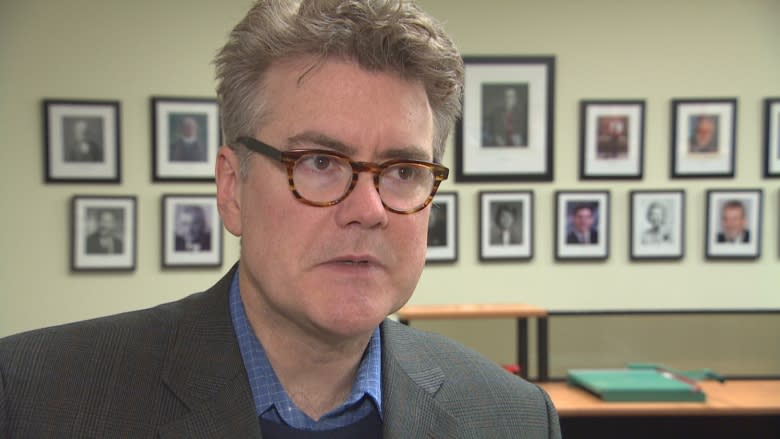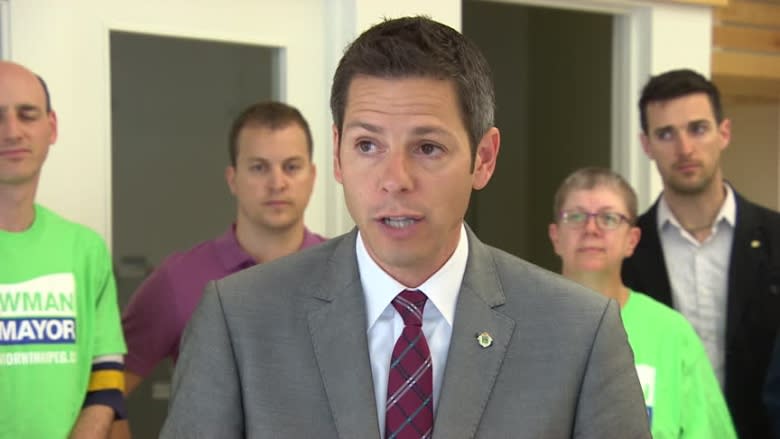Facebook data scandals in U.S. and U.K. have Manitoba politicians pondering elections technology
Manitoba's three largest political parties say they don't employ social media analytics tools the Liberals describe as a worsening electoral "arms race" and the NDP says may be subject to greater government regulation.
The office of Winnipeg's mayor, however, has refused to reflect on the role technology played in Brian Bowman's 2014 electoral victory.
On both sides of the Atlantic Ocean, consulting firm Cambridge Analytica is under fire for the alleged misuse of personal data belonging to tens of millions of Facebook users.
Officials in the U.K. and U.S. are examining the role the use of Facebook data played in the 2016 Brexit vote and the election of president Donald Trump, respectively.
The allegations involve unauthorized access to personal information and the use of algorithms to mine that data, develop detailed psychosocial voter profiles and then tailor messaging, including fake news, to targeted groups of voters.
The scandal has led some Facebook users to question their use of the website and has sparked a decline in the stock value of several tech giants, as lawmakers in the U.S. and the U.K. ponder greater regulation of social media.
Politicians in other jurisdictions, including Manitoba, are taking notice.
"It's an arms race that's getting worse and worse. The only way things can get better in an arms race is if everybody agrees to regulate and disarm," said Dougald Lamont, the leader of the Liberal Party of Manitoba.
"A lot of people go, 'This tech is amazing.' They don't want to think of consequences of it."
The Manitoba Liberals, governing Progressive Conservatives and Opposition NDP all say they did not engage in any sophisticated form of social media analysis during the 2016 provincial election.
All three parties say they identified their vote the old-fashioned way: by knocking on doors and calling prospective voters, and annotating the voters list supplied by Elections Manitoba.
All three parties say they engaged in basic digital analysis, using measures such as tracking voters who visited their websites, liked posts on Facebook or retweeted Twitter posts. Psychosocial profiling did not occur in the 2016 election, they assert.
"Less than three per cent of the campaign's total allowable budget was dedicated to social media activities, which were solely aimed at disseminating the party's advertising and messaging products on these platforms, not for any form of data mining," Progressive Conservative Party of Manitoba CEO Keith Stewart said in an email statement Tuesday.
Bowman campaign followed 'best practices'
The only campaign that said it engaged in some form of data mining belonged to Brian Bowman during the 2014 Winnipeg mayoral race.
Following that victory, the Winnipeg Sun and Winnipeg Free Pressreported the Bowman campaign engaged in digital marketing strategies and data analysis to assess how well the lawyer's messages were being received on social media.
At the time, Bowman staff also told reporters the campaign employed GPS-enabled apps to help volunteers identify voters, as well as robocalls to identify prospective voters.
The mayor's office refused CBC News requests for interviews about Bowman's campaign tactics on Tuesday.
"There really isn't much more to say," Bowman press secretary Jeremy Davis said in a statement.
"With respect to data, any and all information that was collected was done so with consent and in accordance with applicable laws and best practices."
NRG Research Group president Andrew Enns, who worked on the 2014 Bowman campaign, downplayed the role technology played in the mayoral race that year.
"We ran a couple of Google polls, anonymously, for virtually zero money," he said Tuesday in a telephone interview, describing the methods employed by the Bowman campaign as rudimentary compared to the cutting-edge analytics employed in the U.K. and U.S.
"We were running a battle where no one knew the guy," Enns said of the 2014 mayoral race, which Bowman entered as a relative unknown. "So how do you ID the vote?"
Nonetheless, the Cambridge Analytica scandal has Manitoba NDP president David Woodbury speculating voters are becoming aware of the intersection between social media and politics.
"I saw it in my Facebook feed the other day — someone saying, 'Well, maybe we should just get off Facebook altogether because of some of these revelations," he said.
"I expect this is going to have a lot of attention paid to it by governments all over the world, in terms of what are the practices that need to be followed."



